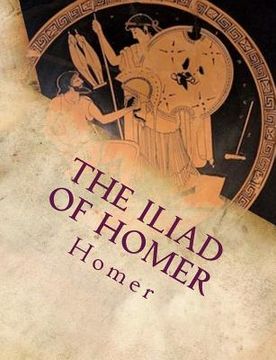Reseña del libro "The Iliad of Homer (en Inglés)"
The Iliad (sometimes referred to as the Song of Ilion or Song of Ilium) is an ancient Greek epic poem in dactylic hexameter, traditionally attributed to Homer. Set during the Trojan War, the ten-year siege of the city of Troy (Ilium) by a coalition of Greek states, it tells of the battles and events during the weeks of a quarrel between King Agamemnon and the warrior Achilles. Although the story covers only a few weeks in the final year of the war, the Iliad mentions or alludes to many of the Greek legends about the siege; the earlier events, such as the gathering of warriors for the siege, the cause of the war, and related concerns tend to appear near the beginning. Then the epic narrative takes up events prophesied for the future, such as Achilles' looming death and the sack of Troy, prefigured and alluded to more and more vividly, so that when it reaches an end, the poem has told a more or less complete tale of the Trojan War. The Iliad is paired with something of a sequel, the Odyssey, also attributed to Homer. Along with the Odyssey, the Iliad is among the oldest extant works of Western literature, and its written version is usually dated to around the eighth century BC. Recent statistical modelling based on language evolution has found it to date to 760-710 BC. In the modern vulgate (accepted version), the Iliad contains 15,693 lines; it is written in Homeric Greek, a literary amalgam of Ionic Greek and other dialects. Note: Book numbers are in parentheses and come before the synopsis of the book. (1) After an invocation to the Muses, the story launches in medias res (in the middle of things) towards the end of the Trojan War between the Trojans and the besieging Greeks. Chryses, a Trojan priest of Apollo, offers the Greeks wealth for the return of his daughter Chryseis, a captive of Agamemnon, the Greek leader. Although most of the Greek army is in favour of the offer, Agamemnon refuses. Chryses prays for Apollo's help, and Apollo causes a plague throughout the Greek army. After nine days of plague, Achilles, the leader of the Myrmidon contingent, calls an assembly to solve the plague problem. Under pressure, Agamemnon agrees to return Chryseis to her father, but also decides to take Achilles's captive, Briseis, as compensation. Angered, Achilles declares that he and his men will no longer fight for Agamemnon, but will go home. Odysseus takes a ship and brings Chryseis to her father, whereupon Apollo ends the plague. In the meantime, Agamemnon's messengers take Briseis away. Achilles then asks his mother, Thetis, to ask Zeus that the Greeks be brought to breaking point by the Trojans, so Agamemnon will realize how much the Greeks need Achilles. Thetis does so, and Zeus agrees. (2) Zeus sends a dream to Agamemnon, urging him to attack the city. Agamemnon heeds the dream but decides to first test the morale of the Greek army by telling them to go home. The plan backfires, and only the intervention of Odysseus, inspired by Athena, stops a rout. Odysseus confronts and beats Thersites, a common soldier who voices discontent at fighting Agamemnon's war. After a meal, the Greeks deploy in companies upon the Trojan plain. The poet takes the opportunity to describe the provenance of each Greek contingent. When news of the Greek deployment reaches king Priam, the Trojans too sortie upon the plain. In a similar list to that for the Greeks, the poet describes the Trojans and their allies. (3) The armies approach each other on the plain, but before they meet, Paris offers to end the war by fighting a duel with Menelaus, urged by his brother and head of the Trojan army, Hector. While Helen tells Priam about the Greek commanders from the walls of Troy, both sides swear a truce and promise to abide by the outcome of the duel. Paris is beaten, but Aphrodite rescues him and leads him to bed with Helen before Menelaus could kill him.

